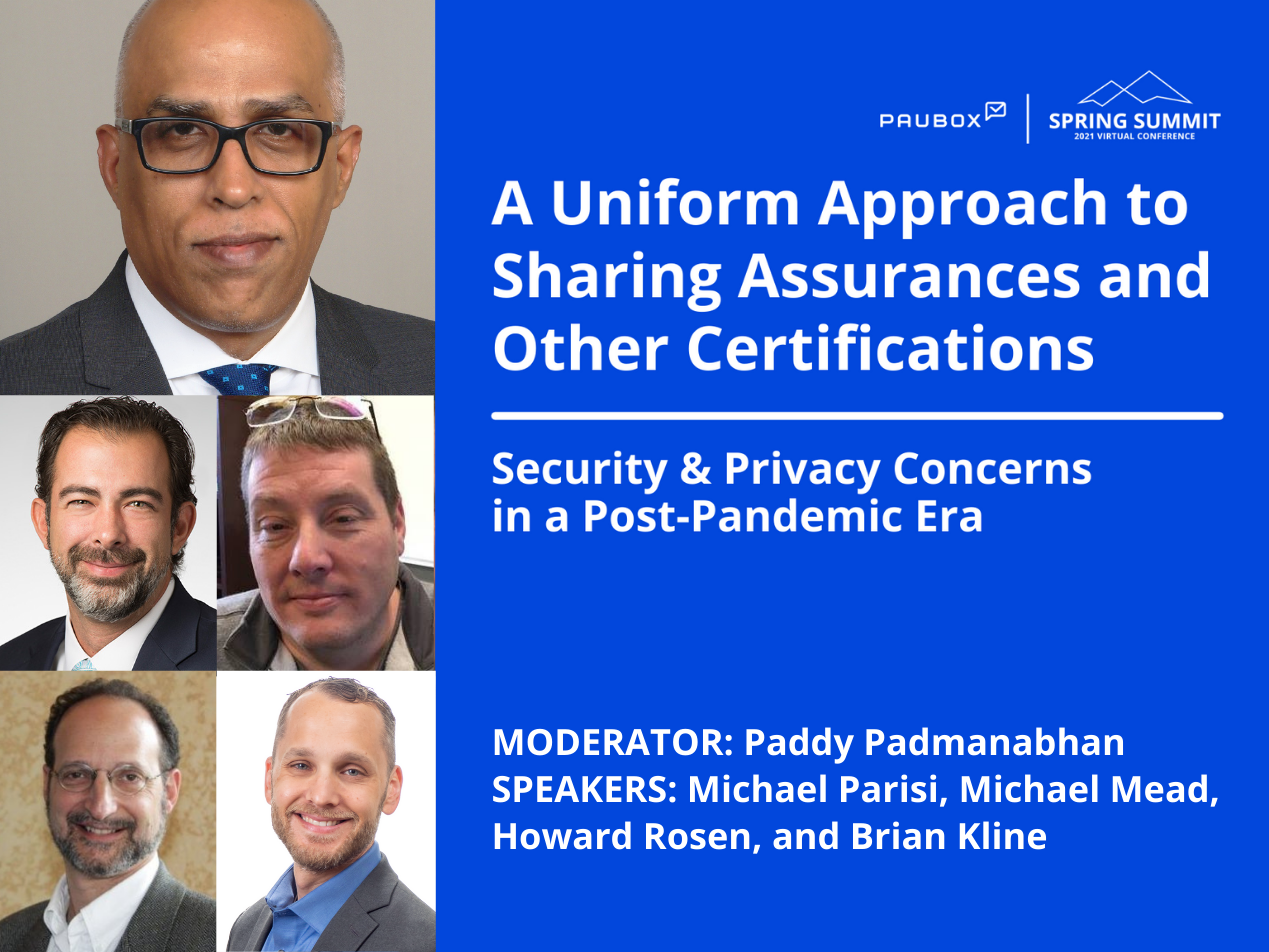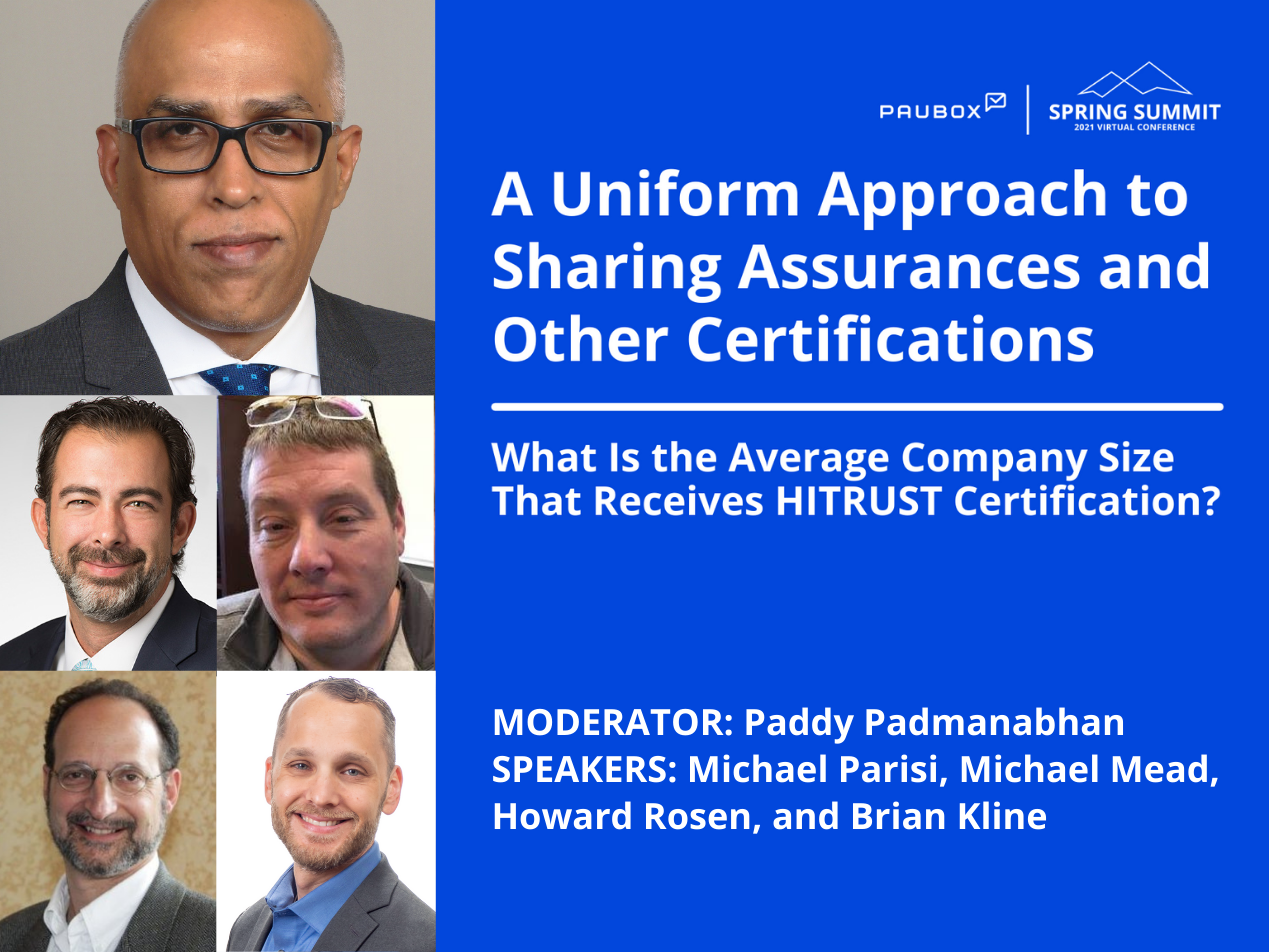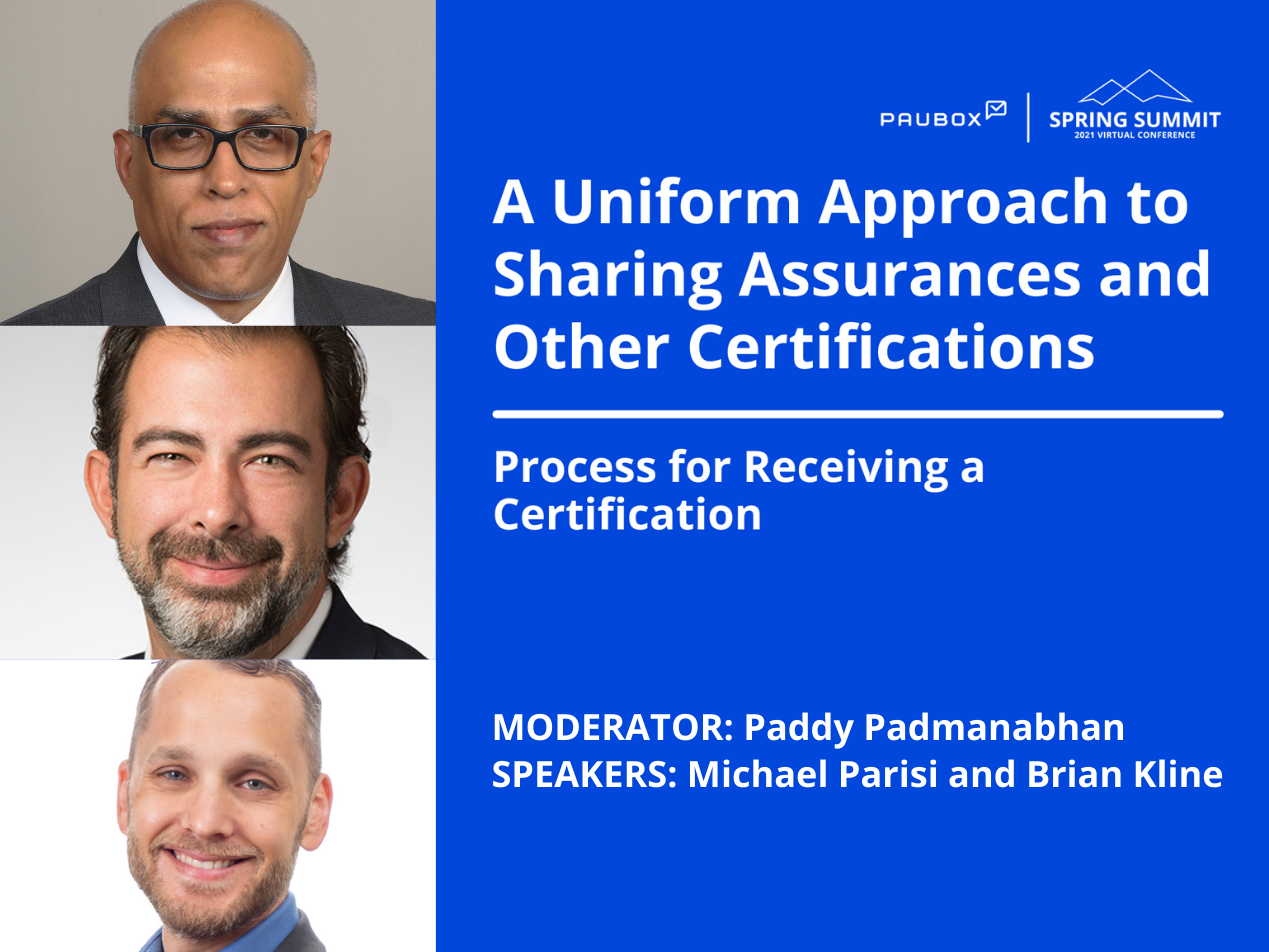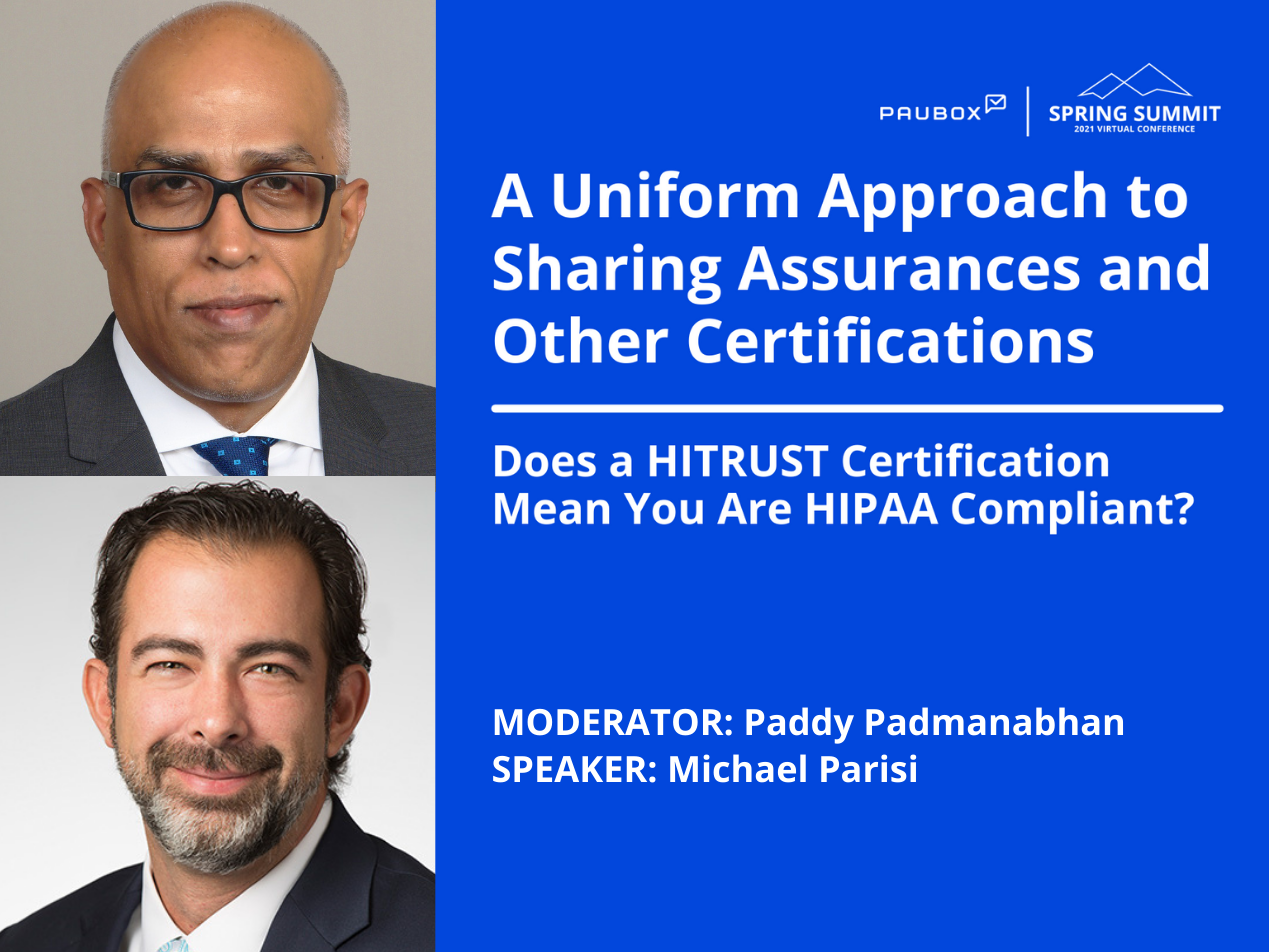6 min read
Paddy Padmanabhan, Michael Parisi, Michael Mead, Howard Rosen, and Brian Kline: Security & privacy
Hannah Trum April 07, 2021

A Uniform Approach to Sharing Assurances and Other Certifications
Paddy Padmanabhan: I want to kind of wrap this up and go out on the table, with each of you, and explore one topic, which is, now we’re in a post-pandemic era, a lot of things have changed about how healthcare is accessed and delivered. And as part of that a lot of things have changed about how patients communicate with providers, and vice versa, a lot of what has gone online. So what does this group think? Is the emerging trend in terms of how patients want to or are communicating with their providers and vice versa? And what are the security and privacy new security and privacy concerns that are emerging as a consequence of that? And what do assurances and certifications do to mitigate those concerns? Or trends? It was the longest question, but I’m hoping that I was able to get that across. So I’d like to go around the table, maybe start with you, Howard. And then we go around the table?
Howard Rosen: Well, it’s interesting, just from what we’re talking about, and obviously, because of the pandemic, there’s been a relaxation of sort of certain concerns in terms of security and privacy issues. What we’re hearing is there’s be some element of that coming back and our clients already going yo from those who’ve done those kinds of solutions. And they’re all the more coming back and re-asking those questions, if you know exactly how is your area secure how you do the privacy, their chief security officers are really starting to get on their case now a lot more than ever before. But frankly, even during the pandemic, there were a lot of questions on that side. So I think what’s happened is, I’m trying to answer a bunch of your questions the patients have always wanted to communicate with their providers, we found was always the providers are more reluctant because of again, concerns over security and privacy. And how they want to communicate is really what they how they like to communicate. So depicts a generational issue as to how they want to communicate. And also concerns on their part for security. privacy, we found is also generational. Frankly, we boomers, are much more concerned with security and privacy than, frankly, my millennial or Gen X kids, because they figure everybody knows everything anyway, and they’re already in trouble. So but for a little flippant, but it’s so it’s a different concern now on the people to the repository of that, which is the provider payer side, they’re much more concerned about it. And so they continue to have all these issues and concerns. And frankly, with the more ubiquity of communication with the patients and the providers, we’re gonna, we’re starting to see again, more of a lockdown and say, Okay, look, we really got to make sure these are locked down with the hacking that’s going on, and all those other pieces, I don’t know, Michael, you see a lot of it, there’s actually a growing concern in that area. So you’re gonna have both sides going simultaneously, you can go to more ubiquity and allowance of the patients and communicate in a variety of remote ways with their provider and payers. At the same time, I think I get a much bigger concern of security and privacy, because you’ve got this wider range and ubiquity and beep by you’ll be what bring your own communication, and people fighting against apps, as a result, because of that fatigue.
Paddy Padmanabhan: Michael Mead, what about you? What are your thoughts,
Michael Mead: I believe that it’s going to be along the lines of secure portals and, and exposure of that portal either through the web or through an app. Prior to the pandemic, we communicate with about 60,000 members slash patients a month. And we were we use a mixture of those two solutions. And many of the hospital systems that we work with, also do the same through some type of Portal either exposed through the secure web or through a secure app. I think that’s going to continue one I think that the millennials and my fellow Gen Xers are very tech-savvy like to use their iPad and iPhone and like to be able to communicate with Doctor their time, communicate, send a message at 10 o’clock, and then get an answer the following day. So I think that it’s going to continue I think it’s going to get much more used as more and more millennials come in and start utilizing the healthcare market. And I think that that’s definitely where it’s going to go some of some physicians will hold back some physicians I still secure fax and I still get an email from Juneau Believe it or not very old 20 30-year-old email service. But the majority, I would say 99% are requiring us to use secure portals to communicate back and forth. And we’re having our members do the same with us.
Brian Kline: I’ll be quick on adding, Mike and Howard said. So as both of them combining, people are going to communicate how they want, whether it’s a generation thing, or just a preference and they’re going to give me how they want from the provider side where I really see the future going. And I think the pandemic has taught us is in the teleworking, working from home, the remote, and also your business continuity. I know, even personally, we switched providers, just because they were not available during the initial part of the pandemic is, hey, we got to close down our shop, because we just we don’t know what to do. So we went to go find someone that could see us that did have maybe a telemedicine type provider. So I think a lot of providers are going to, or they should be focusing on the remote working. So if they do need to move their workforce, to an alternative location, most likely working from home, but any other kind of business recovery, business continuity of operations, disaster recovery. I mean, the ice storm we saw in Austin recently or in Texas, is people just not prepared for this. So preparing for the worst so that you can be a differentiator and market at where you can keep your services to what your customers want, during any kind of disaster.
Paddy Padmanabhan: Michael, I’m gonna let you have the last word on this.
Michael Parisi: Yeah, sure. Agree, with all the comments provided since it so far, and maybe I’ll close with a little bit of a different perspective. But I do think it’s still related Patty, to your point. You know, when you look across all the different industries that we’re familiar with, there are very few, I think that translate into that the highest most impactful risk that we can define the end of the day, we’re all talking about risk, right. And I would put that in three different categories. It’s critical infrastructure, a lot of the things that Brian was talking about, right American Fork, and some of the things that that are in place there, you’re getting put God within there is well, it’s travel and hospitality, right. So airlines, hotels, etc. And it’s healthcare. And I would say there’s no greater risk than the loss of human life. And that’s what we are trying to constantly deal with within the healthcare industry. So whatever communication mechanism exists, as Brian mentioned, people are going to use what they want to use. We’re scared people as to what that could translate into as it relates to the loss of human life. And so I don’t think we’re ever going to see a departure from increasing expectations around the level of assurance relative to security and privacy, regardless of the mechanism that we’ll use.
Paddy Padmanabhan: Thank you very much. Well, we are out of time here was a wonderful discussion. I want to thank everyone on the panel for chiming in with your thoughts and for sharing so generously with their experiences.
Watch every minute of this session here.
Learn more about Paubox Spring Summit, Secure Communication During a Pandemic.
Read a full recap of Paubox Spring Summit.
About Paddy Padmanabhan Paddy Padmanabhan is the founder and CEO of Damo Consulting, a growth strategy and digital transformation advisory firm that works with healthcare enterprises and global technology companies. He is the host of The Big Unlock, a podcast focusing on healthcare digital transformation, and author of the book, The Big Unlock: Harnessing Data and Growing Digital Health Businesses in a Value-Based Era.
About Michael Parisi Michael Parisi is the vice president of business development & adoption at HITRUST. He’s a seasoned information security and privacy industry professional. He has served as a lead healthcare industry expert, a national healthcare third-party assurance specialist, and the national HITRUST services lead for PricewaterhouseCoopers.
About Michael Mead Michael Mead, BCPA, is the chief operations officer for The Medical Cost Savings Solution, where in just the past three years he has led the effort to save self-pay patients over $1.5 billion in their medical expenses. Before joining MCS, he led top Medicare Advantage programs in the reorganization and the implementation of new systems.
About Howard Rosen Howard is the strategic and visionary leader of LifeWIRE, which he invented and developed as a patented population management communication platform that humanizes digital communication through personalized, responsive interactions between parties like healthcare providers and patients.
About Brian Kline Brian Kline is the compliance and standards lead for Webb Adams — a veteran-owned business composed of cybersecurity and policy professionals well-versed in designing and managing security, privacy, and compliance programs. Kline is passionate about helping clients meet compliance standards and preparing them for industry certifications and attestations such as HITRUST, HIPAA/HITECH, SOC 2, GDPR, and ISO 27001.
Learn more about these panelists.
Subscribe to Paubox Weekly
Every Friday we'll bring you the most important news from Paubox. Our aim is to make you smarter, faster.






